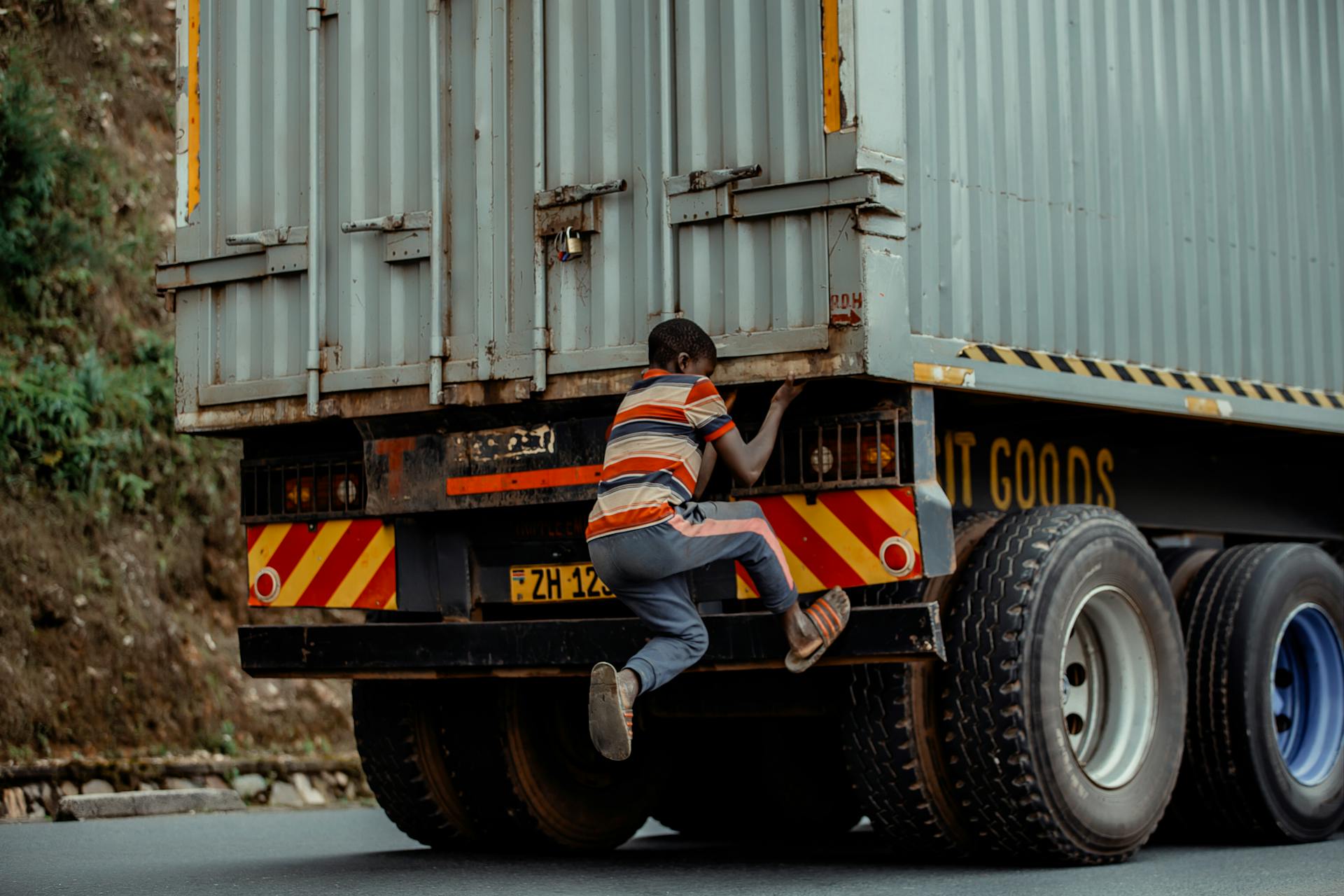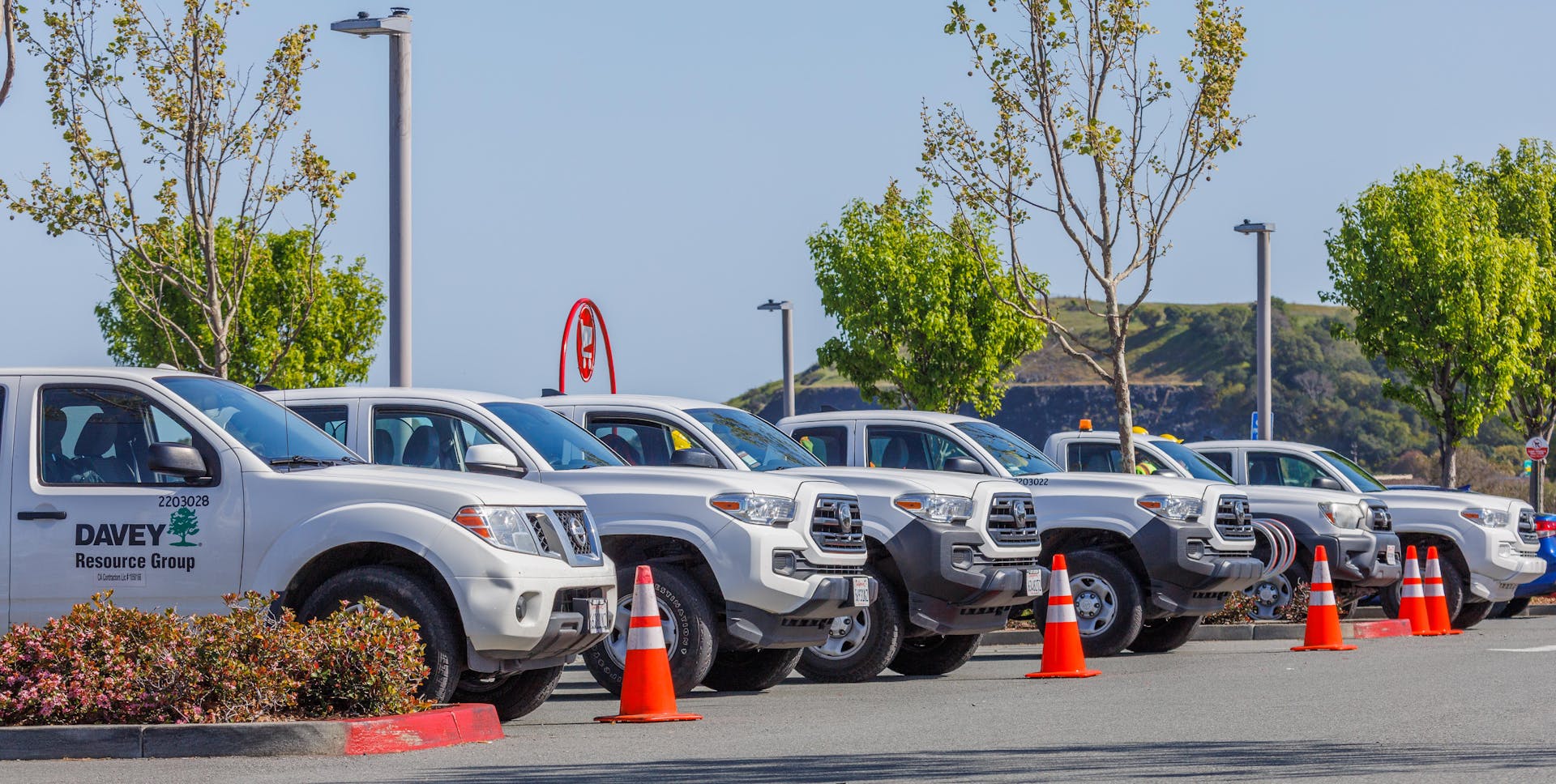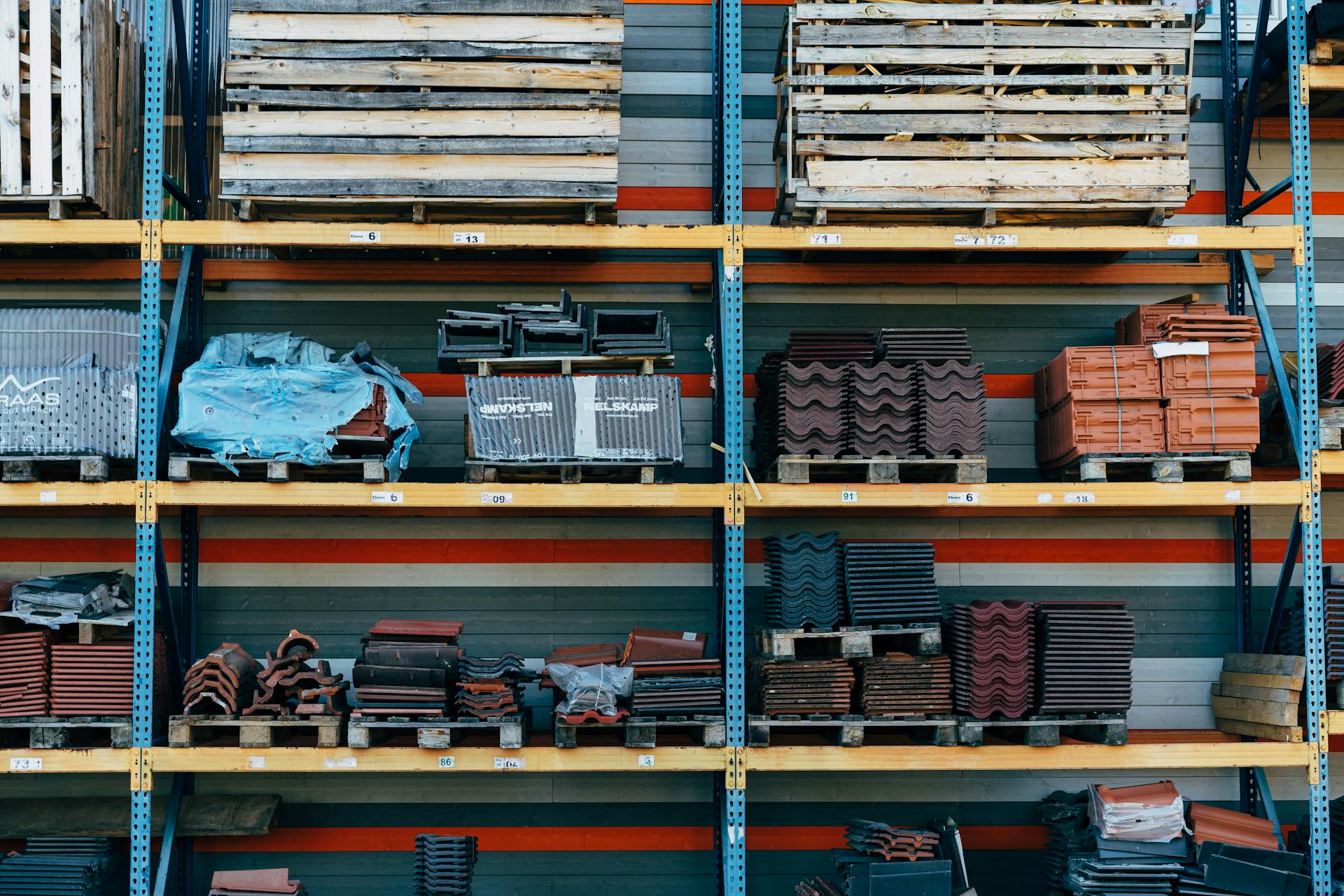
Choosing the right industrial stretch wrap for your business can be a daunting task, especially with so many options available. The type of stretch wrap you need depends on the size and weight of the loads you're wrapping.
Stretch wrap thickness is a crucial factor to consider, with thicker wraps offering more protection against damage but also being more expensive. Thicker wraps are ideal for heavier loads or those with fragile contents.
The strength of the stretch wrap is also important, with some wraps designed to hold up to extreme temperatures or chemicals. Some wraps are even treated with anti-static properties to prevent damage to electronics.
Ultimately, the best industrial stretch wrap for your business will depend on your specific needs and requirements.
Types of Industrial Stretch Wrap
Industrial stretch wrap comes in many varieties, each with its own use. One type of specialty stretch wrap is designed for unitizing loads, while others have specific applications.

True gauged stretch film is known for its exceptional stretch, cling, and strength, but it uses more petroleum-based resins, making it more expensive. Equivalent stretch film is a budget-friendly option that uses a different resin blend and multi-layering techniques to create a thinner yet stronger product.
Industrial plastic wrap rolls come in various sizes and lengths, and selecting the right roll size is crucial for optimal performance and cost efficiency. Popular stretch film sizes include 5" x 1000' x 80Ga. for bundling film and 20" x 5000' x 80Ga. for machine pallet wrap.
M Stretch High Toughness (HT) Industrial Stretch Wrap is a high-performance film made with high molecular weight polymers, offering high puncture resistance and load retention. This film is suitable for irregular loads and heavy loads requiring high load retention.
What's It Made Of?
Stretch wrap is made from a special type of plastic called linear low-density polyethylene (LLDPE). This material is chosen because it has a high elastic recovery, which makes it perfect for wrapping and holding large loads together.
LLDPE is the most common material used in industrial stretch wrap because of its elongation at break and puncture resistance. This means it can stretch a lot without breaking and can withstand rough handling.
Stretch film, also known as stretch wrap, is made from the same LLDPE material. It's designed to securely bundle and stabilize products, and can stretch up to 300% without breaking. This makes it perfect for pallet wrapping and other applications where a strong, flexible film is needed.
Cast vs Blown?
Cast stretch wrap is made using the cast extrusion process, which involves heating plastic material and pushing it through a flat die slot to create a flat sheet.
This process boasts benefits like clearer transparency, ease of use, and a good grip with two-sided cling, making it a popular option.
Cast stretch wrap is also more affordable to produce due to reduced manufacturing costs, which is a major advantage.
The blown extrusion process, on the other hand, produces a tougher and more flexible stretch wrap with a high degree of memory once stretched.
This makes blown stretch wrap more secure for loads, but it's also more expensive than cast stretch wrap.
Blown extrusion produces a higher cling quality, but the cost of production is also higher because it produces more film per hour than cast extrusion.
Cast extrusion is a faster process that produces a more consistent product with better performance characteristics, making it a great option for many operations.
Blown stretch wrap has superior memory, strength, and tear resistance, making it an effective option for certain applications.
However, cast stretch wrap has a clearer transparency and less noise when stretching, making it a good choice for operations that value these characteristics.
Coreless
Coreless stretch wrap is a game-changer for businesses looking to reduce waste and increase efficiency.
It's more sustainable than regular stretch wrap because it doesn't have a core, which means nothing gets thrown out after it's used up. Pair it with a reusable core for even more efficiency.
One key benefit of coreless stretch wrap is that it always comes pre-stretched, making it a convenient choice for many applications.
If you're looking to promote sustainability at your business, coreless stretch wrap is a great option to consider.
Colored
Colored stretch wrap is a type of industrial stretch wrap that's designed to make it easy to separate shipments. It's often used in facilities that need to keep things organized, like warehouses.
The USDA uses only blue stretch wrap, so it's easy to identify if it gets into food. This color-coding system can be used both during shipping and in storage.
Colored stretch wrap is also designed to be puncture resistant, which is a big plus. However, it can make it harder to see what's inside the pallet, which can be a problem for transportation workers.
It's made to order, so if the manufacturer doesn't have a batch in stock, it can take a while to be produced and delivered. But if you create a system of organization and implement it, you can watch your shipping and storage efficiency increase.
UV
UV stretch wrap is a great option for outdoor use because it prevents photodegradation, a process that damages the wrap due to sunlight and air exposure.
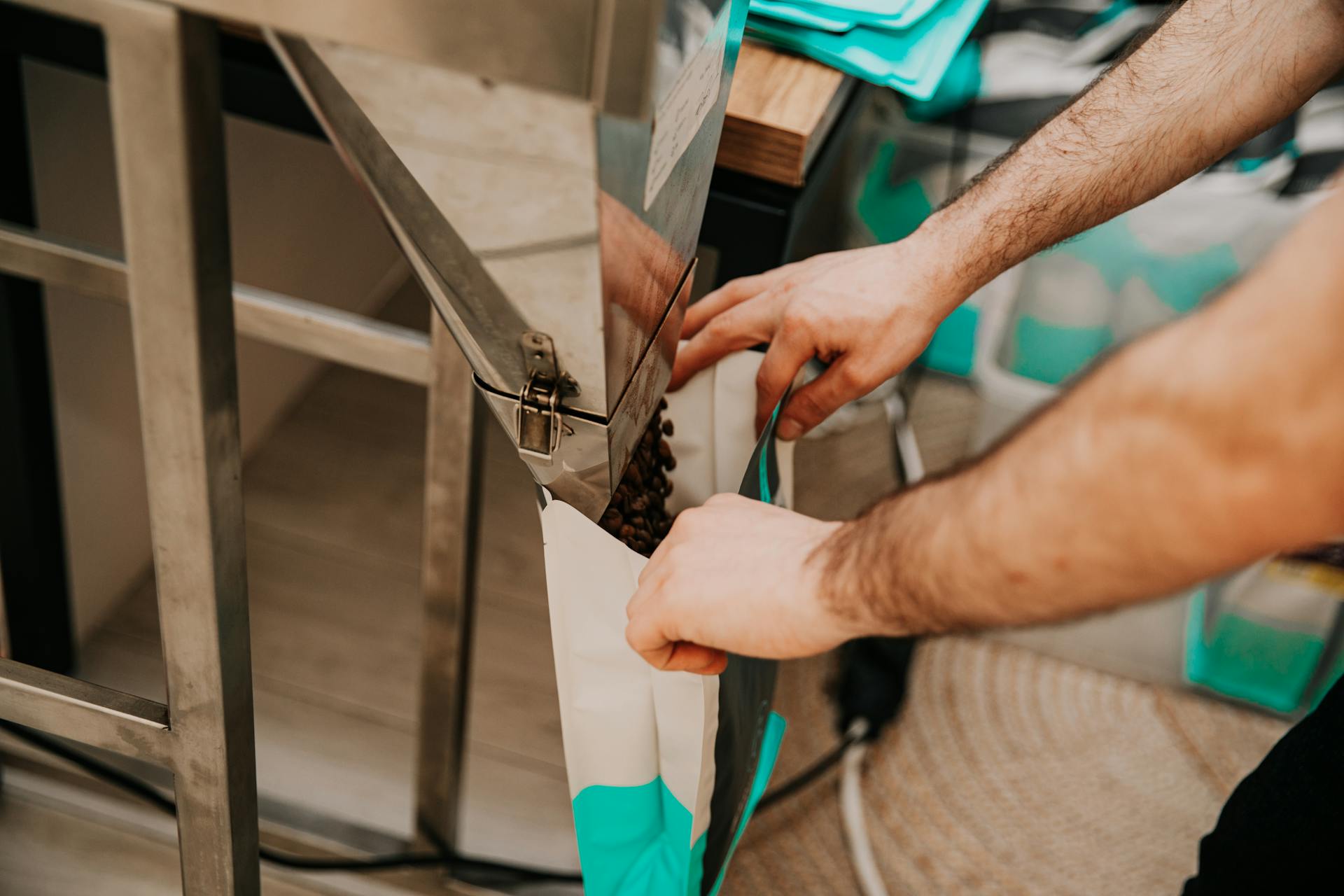
This type of wrap is made with a special chemical makeup that makes it more expensive than standard stretch wrap.
If you're wrapping or storing loads outdoors for extended periods, UV stretch wrap is a good choice to avoid degradation.
It's also worth noting that UV stretch wrap is made to order, which can take about a month to arrive at your business.
Popular Sizes
Industrial plastic wrap rolls come in various sizes and lengths, tailored to specific wrapping needs.
For bundling two or more products together, a common size is 5" x 1000' x 80Ga.
True Gauged Stretch Film is often used for its exceptional stretch, cling, and strength, but it's thicker and more expensive.
Equivalent Stretch Film is a budget-friendly option, crafted using a different resin blend and multi-layering techniques, resulting in a thinner yet stronger product.
Hybrid rolls are thinner and made with more layers, providing excellent hold and stretch.
For hand pallet wrapping, a popular size is 18" x 1500' x 80Ga., offering excellent stretch and puncture resistance.
Another option is 18" x 1500' x 63Ga., which is an excellent choice for customers looking to reduce hand stretch film costs.
For customers seeking to reduce costs even further, 18" x 1500' x 47Ga. is a hybrid hand stretch film offering increased performance with a thinner film.
For machine pallet wrapping, a superior size is 20" x 5000' x 80Ga., offering excellent stretch and puncture resistance.
A down gauge film option is 20" x 5000' x 63Ga., which offers excellent performance and the ability to lower film costs.
Recommended read: Cd Packaging Size
High Toughness (HT)
High Toughness (HT) industrial stretch wrap is a game-changer for handling irregular loads and heavy-duty applications.
This type of stretch wrap uses high molecular weight polymers to achieve its exceptional toughness. The stretch film is designed to provide high puncture resistance and load retention.
Available in gauges ranging from 17 to 25 microns, High Toughness (HT) wrap offers a total stretch level of up to 250%. This means it can handle loads that would otherwise be too heavy or awkward for standard stretch wrap.
High Toughness (HT) wrap is perfect for use with turntable pallet wrappers, with or without a pre-stretch unit, making it a versatile option for many industries.
Extended Core
The Extended Core is a convenient feature for wrapping objects. It comes with a disposable extended core for easy grip.
You can find Extended Core Stretch in various sizes and gauges, ranging from 80 to 120 gauge. This makes it suitable for a wide range of applications.
For manual application, the Extended Core is a great option. It's designed for hand stretch film, which is typically applied using a handheld dispenser.
If you're using a stretch wrapping machine, you might want to consider a different type of film. Machines require a specific type of film that's designed for automated wrapping.
A different take: How to Wrap Wine Bottle with Wrapping Paper
Film
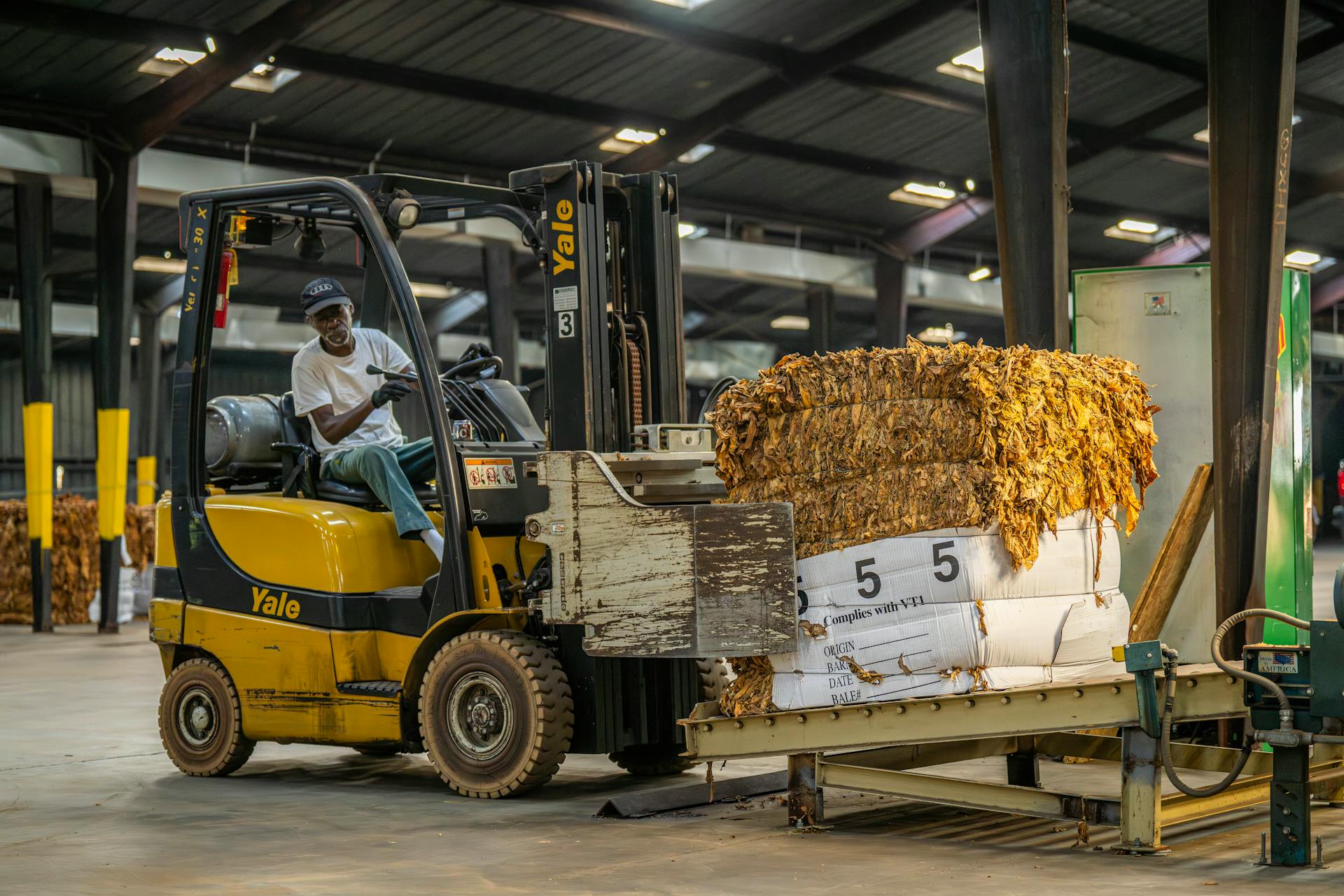
Industrial plastic wrap rolls come in various sizes and lengths, tailored to specific wrapping needs. Understanding the application and load requirements helps in selecting the appropriate roll size, ensuring optimal performance and cost efficiency.
Stretch wrap is made from linear low-density polyethylene (LLDPE), which provides high elastic recovery and puncture resistance. This special type of plastic is used to make stretch wrap so that it can stretch and hold large loads together.
There are two main processes by which plastic stretch wrap is created: cast extrusion and blown extrusion. Understanding the difference between these two extrusion processes is important for knowing how stretch wrap is made.
True gauged stretch film is a thicker film that uses more petroleum-based resins, making it more expensive. Equivalent stretch film is a budget-friendly option that uses a different resin blend and multi-layering techniques to create a thinner yet stronger product.
Popular stretch film sizes include 5" x 1000' x 80Ga, which is common for bundling film, and 18" x 1500' x 80Ga, which offers excellent stretch and puncture resistance for hand pallet wrap.
Advantages of Industrial Stretch Wrap
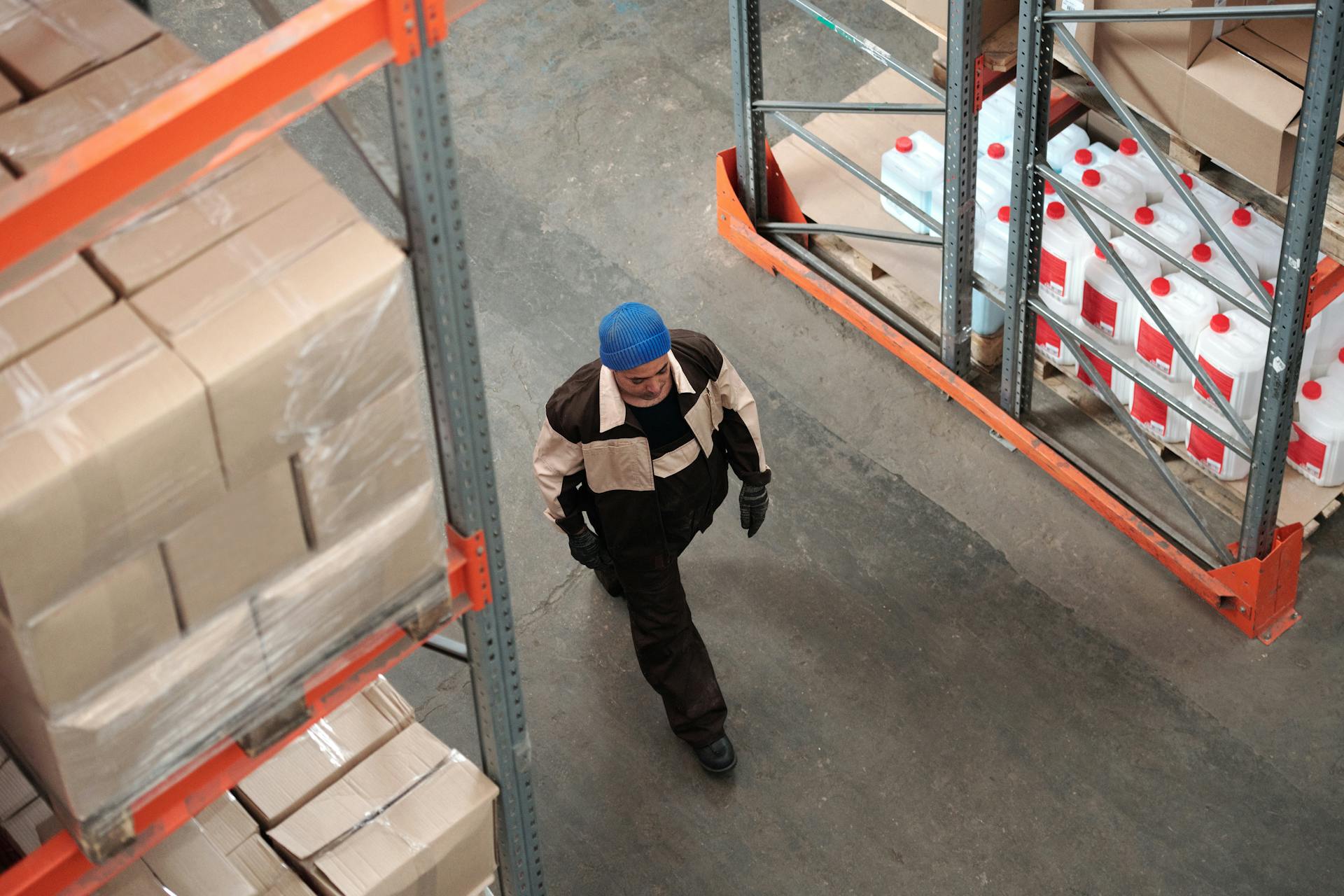
Stretch film securely fastens products to pallets, preventing shifting, movement, and potential injury during transport.
It stabilizes the load and reduces the possibility of objects toppling or falling. This is crucial for preventing damage to products and ensuring a safe transportation process.
Stretch film creates a protective barrier around products, protecting them from dust, dirt, moisture, and other environmental elements. This helps preserve the quality and integrity of the packaged products.
Stretch film is a more cost-effective packaging solution than lashing and shrink-wrapping alternatives. It uses little material and provides exceptional load containment, reducing the need for additional packaging materials.
Stretch film has several key benefits that make it perfect for smaller, or even oddly-shaped loads and large industrial-scale production. These include load stability, cost-effectiveness, versatility, protection, puncture resistance, visibility, and reduced labor.
Hand stretch wrap is manually applied and ideal for smaller or irregular loads, offering flexibility while remaining easy to handle. It's typically available in widths of 12-18 inches, providing control over tension and coverage.
Choosing the Right Industrial Stretch Wrap
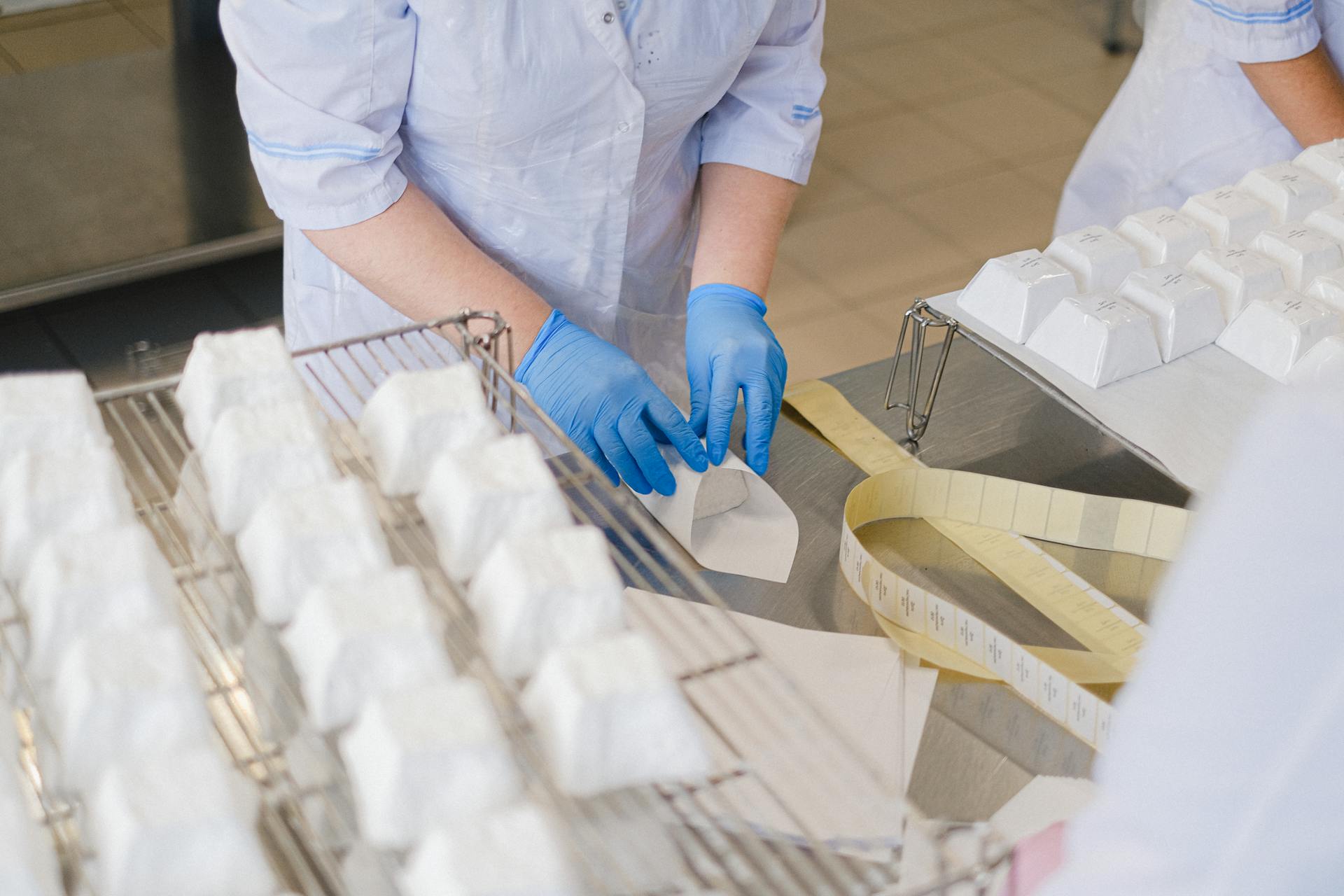
Choosing the right industrial stretch wrap can be a daunting task, especially with so many options available. There are different types of stretch film to choose from, including hand stretch film, extended core stretch film, machine stretch film, and specialty stretch film.
Hand stretch film is available in 12-18 inch wide rolls, while extended core stretch film comes in 10-30 inch wide rolls with built-in handles. Machine stretch film is available in 20-80 inch wide rolls, making it suitable for larger loads. Specialty stretch film, on the other hand, comes in various colors, vented, and anti-static options.
The type of stretch film you choose will depend on the specific needs of your operation. For example, if you're wrapping pallets with heavier loads, you may want to consider a thicker film with higher stretch capacities.
Here are some key considerations to keep in mind when selecting an industrial wrapping film:
- Load Weight and Size: Heavier and larger loads may require thicker films with higher stretch capacities.
- Load Fragility: Delicate items need films with excellent puncture resistance and cling to ensure protection.
- Storage Conditions: Consider if the wrapped items will be stored in varying environmental conditions, such as high humidity or freezing temperatures.
Pre
Pre-stretch wrap is a great option if you're looking to increase cost-effectiveness without sacrificing quality. It uses about 50% less film than other industrial stretch wraps.
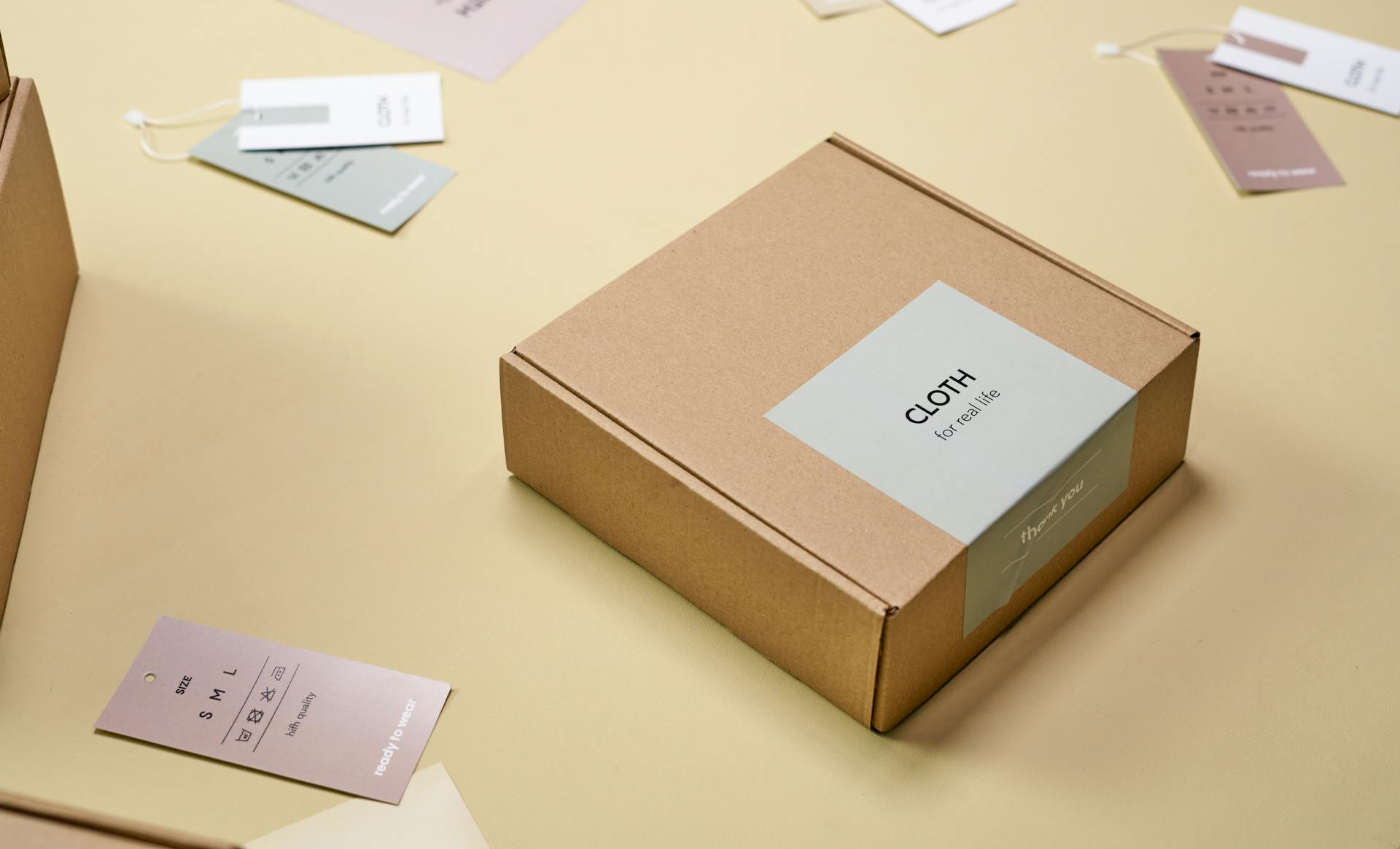
Pre-stretch wrap is already stretched out to 90% of its maximum stretch rate, which means it requires less stretching during the application process. This can be a big time-saver.
Because it's thinner than standard stretch wrap, pre-stretch wrap has poor puncture resistance. This can be a problem in large or uneven loads with multiple corners.
If you're working with loads that don't have a lot of corners or sharp edges, pre-stretch wrap can be a good choice.
Cost Efficient
Using pre-stretch wrap can lead to huge cost savings, with about 50% less film consumption than other industrial stretch wraps.
Pre-stretch wrap is a good option if you're looking to increase cost-effectiveness without sacrificing quality. It's thinner than standard stretch wrap, but still provides a good balance between cost and performance.
M Stretch film is a more cost-efficient option, reducing film usage and waste compared to other machine-grade stretch film. It's thinner but stronger, with high elongation and tensile strength.
By using M Stretch film, you can reduce downtime on automatic wrapping machines, as it has minimal film breakage for uninterrupted wrapping cycles.
A different take: Wine Wrapping Paper
Choosing

Choosing the right industrial stretch wrap can be overwhelming with all the options available. There are several types of stretch film to choose from, including hand stretch film, extended core stretch film, machine stretch film, and specialty stretch film.
Hand stretch film comes in 12 to 18 inch wide rolls, making it ideal for manual wrapping applications. Extended core stretch film has built-in handles and is available in 10 to 30 inch wide rolls.
Machine stretch film is designed for use with automated or semi-automated wrapping machines and offers higher stretch capabilities and improved load stability. This type of film is available in 20 to 80 inch wide rolls.
Specialty stretch film includes colored, vented, and anti-static options, which can be useful for specific applications. Many types of stretch film are also environmentally friendly, being recyclable or biodegradable.
To help you choose the right type of stretch film, here are some key factors to consider:
Ultimately, the type of stretch film you choose will depend on your specific wrapping needs and requirements.
Selecting the Proper Camera
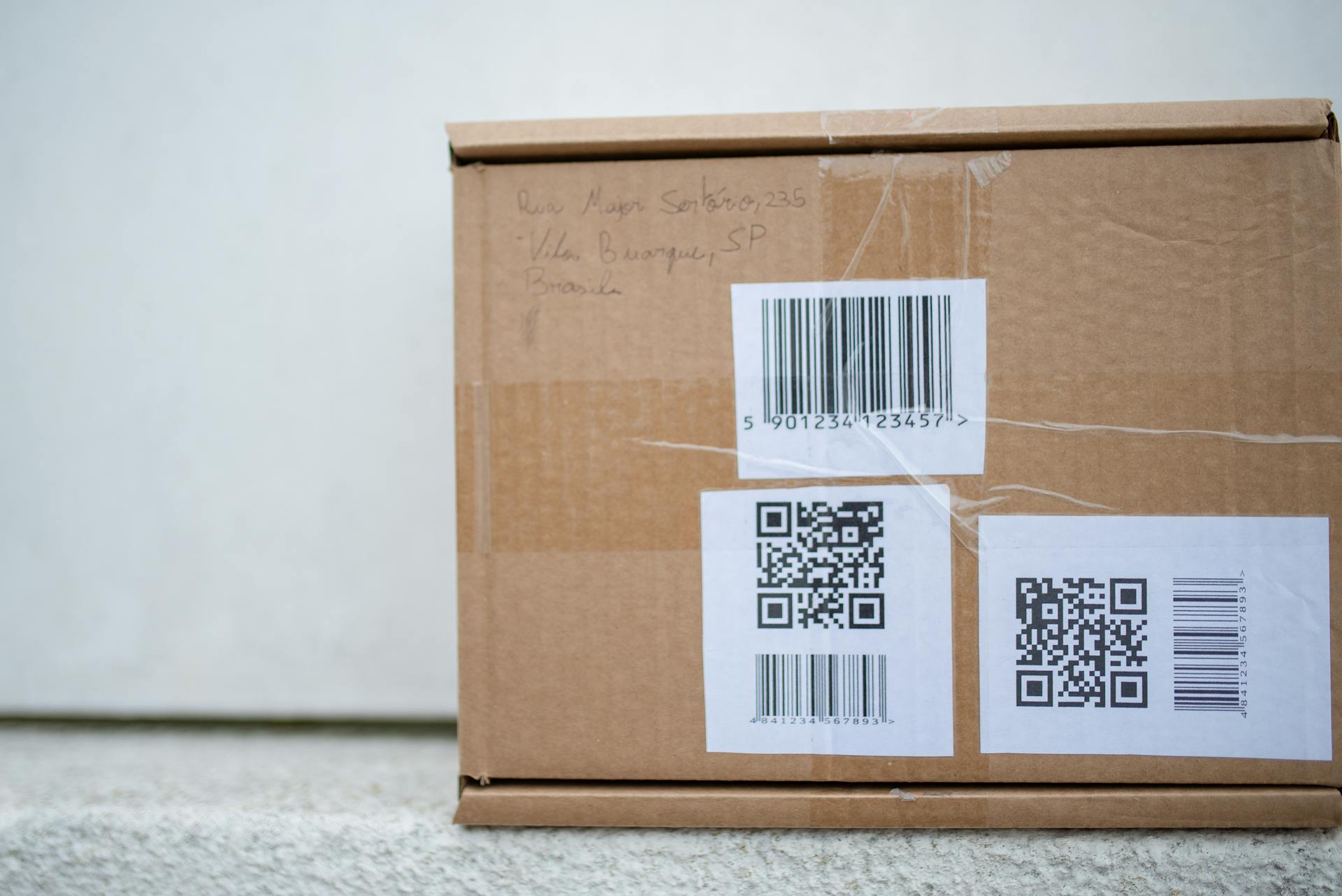
Heavier and larger loads may require thicker films with higher stretch capacities, similar to how a camera with a sturdy build and high-quality lens can handle demanding situations.
Load Fragility is also a consideration, just like how delicate items need films with excellent puncture resistance and cling to ensure protection. This is similar to how a camera with a fragile sensor may require extra care and protection.
Storage Conditions, such as high humidity or freezing temperatures, can affect the performance of both industrial wrapping films and cameras. For example, a camera exposed to extreme temperatures may malfunction or suffer from condensation.
Here's a brief comparison of camera types and their suitability for different environments:
Industrial Stretch Wrap Machines
Industrial stretch wrap machines are a game-changer for high-volume operations, offering consistent tension and speed. They're perfect for large, standardized pallets, reducing labor time and material waste.
Machine stretch wrap is available in wider rolls, ranging from 20-80 inches, making it ideal for bulk packaging. This type of wrap excels in efficiency and uniformity, making it a great choice for large-scale operations.
With machine stretch wrap, you can expect to reduce labor time and material waste, making it a cost-effective solution in the long run.
How It's Made & Why It Matters
Industrial stretch wrap machines use a specific type of plastic wrap that's created through two main processes: cast extrusion and blown extrusion.
Cast extrusion is one of the primary methods used to make plastic stretch wrap.
The resulting wrap from cast extrusion is often used for general-purpose applications.
Blown extrusion, on the other hand, produces a wrap with a more uniform thickness and higher clarity.
This process is often used to create wrap for applications where visibility is crucial, such as in the food industry.
Standard Machine Roll Products
Standard Machine Roll Products are available as made-to-order, allowing businesses to customize their stretch film to fit their specific needs.
You can choose from a range of machine stretch film versions that are designed to meet different industrial requirements.
GP Machine
GP Machine stretch film is a great option for turntable pallet wrapping machine applications. It's an economical solution that comes in a range of thicknesses, from 15 to 30 microns.
One-sided cling is a key feature of GP Machine stretch film, making it easy to apply and remove. This type of cling is also consistent in quality, ensuring a reliable wrap every time.
GP Machine stretch film is suitable for pallets with relatively uniform load shapes and heavier film gauges for heavier loads. This film can stretch up to 200% with a higher film thickness, making it perfect for heavier loads.
Available in a range of thicknesses, GP Machine stretch film is a versatile option for many industrial applications. Its good puncture resistance adds to its overall durability and effectiveness.
For turntable pallet wrappers with or without a pre-stretch unit, GP Machine stretch film is a reliable choice. It's designed to work efficiently and effectively with automated or semi-automated wrapping machines.
High Performance Machine
High-performance machine stretch wrap is formulated from high-performance polymers, providing high film toughness to cater to regular and irregular pallet load configurations.
This type of stretch wrap offers good load stability and is thicker, allowing it to be stretched up to 250% on stretch wrappers with pre-stretch units.
The M Stretch High Performance (HP) Machine Stretch Wrap is a prime example of this, featuring high film toughness, stretchability, and load stability.
Available in a range of thicknesses from 12 to 30 microns, this film is suitable for machines with a pre-stretch unit and can wrap both uniform and irregular-shaped loads.
The higher pre-stretch level lowers the cost of film used per pallet, making it a cost-effective solution for high-volume operations.
This type of stretch wrap is ideal for applications where load stability and high stretch levels are crucial, such as in the transportation of heavy or irregularly-shaped goods.
With its high film toughness and stretchability, high-performance machine stretch wrap can withstand the rigors of high-speed automatic and semi-automatic stretch wrappers.
By using a thinner film or higher pre-stretched levels, the total stretch level can be as high as 300%, further reducing costs and increasing efficiency.
High-performance machine stretch wrap is a game-changer for industries that require high load retention and puncture resistance, such as food and pharmaceuticals.
In these applications, the M Stretch High Toughness (HT) Industrial Stretch Wrap is a popular choice, offering excellent film toughness and high load retention.
Available in thicknesses from 17 to 25 microns, this film is suitable for turntable pallet wrappers with or without a pre-stretch unit, and is ideal for applications where high puncture resistance and load retention are critical.
Industrial Stretch Wrap Products
Our industrial stretch wrap products are designed to provide top-notch protection for your goods. They shield products from dust, dirt, and water damage.
Protecting your pallets during transportation is a breeze with our industrial-strength plastic wrap, which allows for safe and secure handling.
Industrial-strength plastic wrap is a game-changer for transporting pallets, and our product range has got you covered.
Product Protection
Industrial stretch wrap products like M Stretch offer excellent product protection. They protect products from dust, dirt, and water damage.
M Stretch industrial plastic wrap roll is designed to securely transport pallets. This makes it a great option for warehouses and factories.
Our industrial-strength plastic wrap is strong and durable. It can withstand the rigors of transportation and storage.
This type of protection is especially important for products that are sensitive to the elements. It helps prevent damage and keeps products looking their best.
M Stretch industrial plastic wrap roll is a reliable choice for product protection. It's a must-have for any business that relies on palletized shipping.
Industrial Plastic Rolls
Industrial plastic rolls come in various sizes and lengths, tailored to specific wrapping needs. Understanding the application and load requirements helps in selecting the appropriate roll size, ensuring optimal performance and cost efficiency.
Industrial plastic wrap rolls can range from 4 inches to 50 inches in width, and from 667 feet to 4000 feet in length. For example, the 4" X 667' 1.25 mil ZeRust Stretch VCI - Ferrous Yellow - Case of 12 Rolls is a compact option suitable for smaller pallets.
Handfilm, on the other hand, is applied by hand using the power of the operator, and is typically designed for those who unitize less than 10 pallets per day.
Machine roll stretch film, available as made-to-order, offers a high level of flexibility in terms of size and length.
Industrial plastic wrap rolls can be made of various mils, such as 1.25 mil, 4 mil, or 6 mil, depending on the specific application and load requirements.
Here are some examples of industrial plastic wrap rolls:
These are just a few examples of the many types of industrial plastic wrap rolls available. By understanding the specific needs of your application, you can select the right size and type of roll to ensure optimal performance and cost efficiency.
How to Use Industrial Stretch Wrap
Industrial stretch wrap is a game-changer for businesses that need to package and transport goods. Load stability is one of its key benefits, keeping products securely in place during transport.
You can achieve this by wrapping your pallets with hand stretch film, which is perfect for smaller or irregular loads. It's also cost-effective, minimizing material waste and reducing overall packaging costs.
To wrap a pallet with hand stretch film, start by determining the amount of film needed based on pallet weight and height. Then, tie the film to the corner of the pallet and begin wrapping the bottom, pulling the film to reach maximum stretch and hold tension.
With industrial stretch wrap, you can stretch it up to 300% to ensure tight wrapping with less material. This also makes it puncture-resistant, durable enough to withstand sharp edges and rough handling.
Operationally Effective
Using industrial stretch wrap can be a game-changer for your operation, especially when it comes to reducing set-up times. M Stretch machine-length stretch wrap rolls can reduce set-up times because the easy-to-use film provides good cling while leaving no sticky residue.
Good cling is key when using stretch wrap, and the M Stretch film delivers. This means you can quickly and easily secure your loads without having to worry about the wrap coming loose.
By choosing the right stretch wrap for your operation, you can streamline your processes and get more done in less time. M Stretch machine-length stretch wrap rolls are a great option for anyone looking to improve their operational efficiency.
Hand
Hand wrapping a pallet with stretch film is a great alternative to using a stretch wrapper. You'll need to determine the amount of film needed based on the pallet weight and height.
For example, if the pallet is heavy, you'll need more revolutions to secure it properly. The article suggests that the heavier the pallet, the more revolutions will be needed.
To start, tie the stretch film to the corner of the pallet. Then, begin wrapping the bottom of the pallet while pulling the film to reach maximum stretch and hold tension.
It's essential to check if the stretch film is food-grade before using it for packaging, especially if you're planning to wrap food items. Food-grade stretch films meet safety standards for direct contact with food.
Make sure to wrap multiple revolutions around the pallet base, and then slowly work your way up, moving up half the film width with each revolution. This will ensure a secure and stable wrap.
If you're planning to store the pallet outdoors, consider adding a UVI inhibitor to slow down the degradation of the film. However, even with UV protection, outdoor storage is limited before the film breaks down.
Stretch film is not the same as food cling wrap, and it's designed to have much more stretch. Most stretch films are not made for direct food contact.
Frequently Asked Questions
Stretch wrap is typically made from linear low-density polyethylene (LLDPE). This type of plastic provides excellent durability and flexibility.
Stretch wrap is usually recyclable, but it's best to check local recycling guidelines as not all recycling centers accept it. This is why it's essential to confirm with your local recycling center before disposing of stretch wrap.
Stretch wrap is excellent for securing items during a move, and it can wrap and protect furniture, bundle boxes, and confirm loose items. I've seen it used to move large appliances with great success.
There are several types of stretch wrap, including hand stretch wrap, machine stretch wrap, colored stretch wrap, and vented pallet wrap, each serving different needs and purposes. You can choose the right type of stretch wrap for your specific application.
Standard stretch wrap does not offer UV protection, but specialized stretch wraps are available with UV inhibitors. This is essential for protecting goods from UV damage, especially if they'll be exposed to sunlight for an extended period.
The thickness of stretch wrap needed depends on the load and usage, ranging from 60 to 150 gauge; a higher gauge indicates a thicker wrap. It's essential to choose the right thickness for your application to ensure maximum protection.
Colored stretch wrap is available in various colors and can be helpful for quick identification of pallet contents or for added security. This can be especially useful in warehouses or factories where multiple pallets are stored.
While stretch wrap is quite durable and can withstand a degree of puncturing and tearing, it is not entirely puncture-proof. The resistance can vary depending on the thickness of the wrap.
A stretch wrap supplier or manufacturer can provide guidance on determining the amount of stretch wrap needed for your application, based on the size and type of the load and the gauge of the wrap. They can help you get the right amount of stretch wrap for your needs.
Featured Images: pexels.com
